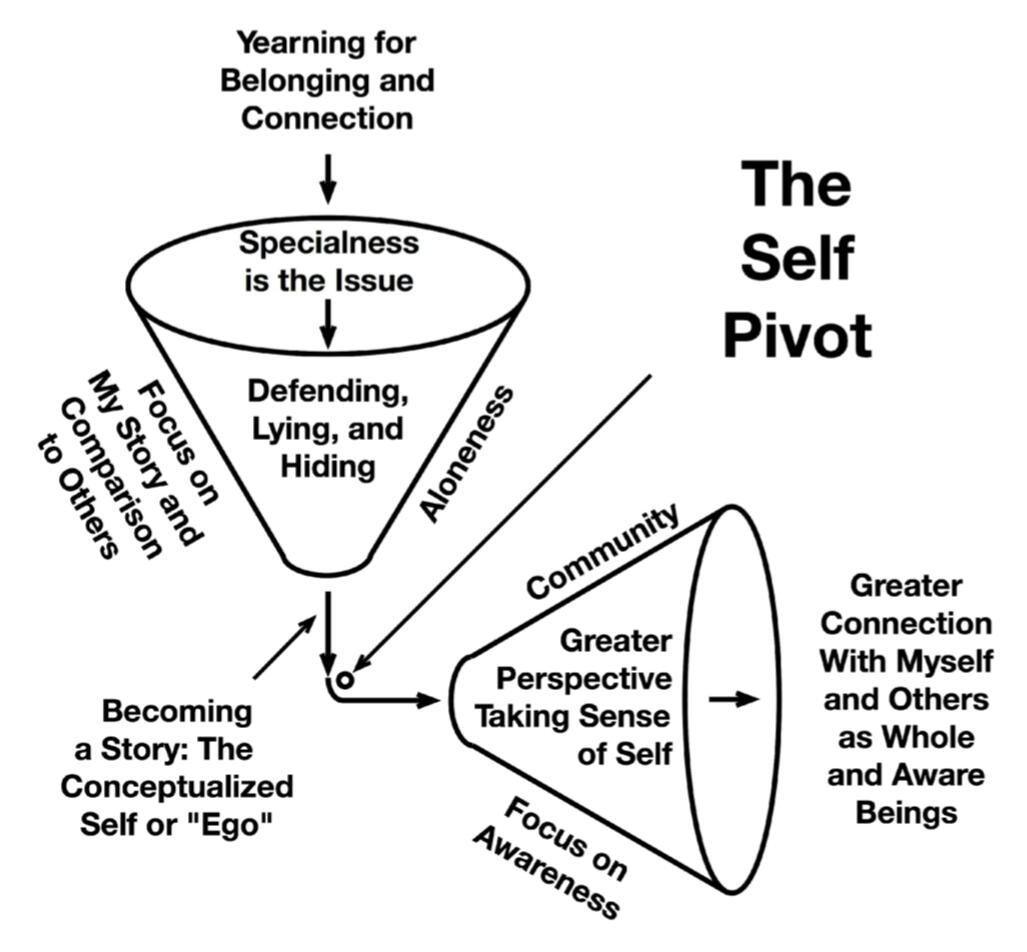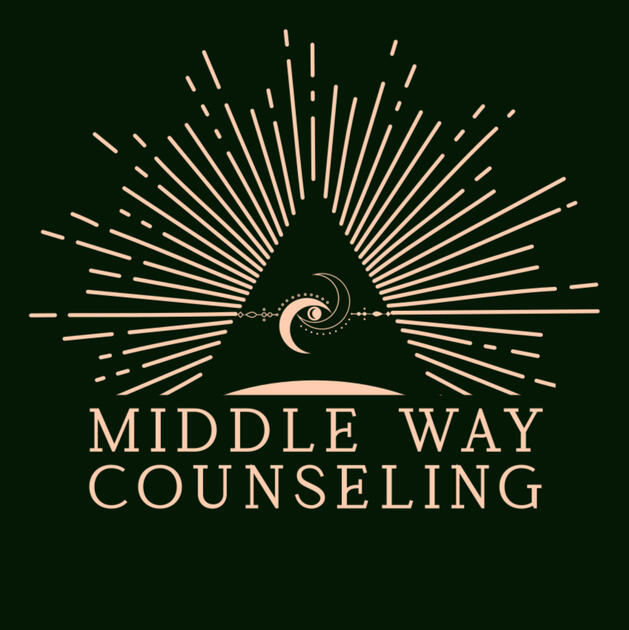
Find Your Way
A counseling organization committed to bringing increased awareness and healing to the unique 21st century challenges of being human. We help you and our community at large to understand the mind and the problems it can create. From new understanding springs action. Let us help you to repair, reformulate, and restructure your life into that which you once dreamed it could be.
How We Help
The Middle Way is a philosophical approach to exploring the benefits and costs of our current strategies of living. We will seek to create a more effective behavioral balance for the sake of being and becoming our best selves. When we clarify the understanding of our life situation we can use that wisdom towards the betterment of our daily choices and the opportunities life affords us. Through giving you a clear lens of how the human Mind works, we can show you how to start perceiving and interacting with the thoughts, feelings, and experiences of your life in a way that gives you a new flexibility to create a full and meaningful life worth living. If you want to get straight into the nitty gritty details, click on any of the following in-depth articles for more information about our evidence-based practice strategies. These are not short reads. So if only you want the higher level information about our practice, continue to scroll downwards.
Who We Help
Middle Way Counseling provides virtual professional mental health counseling/coaching services to all who reside in the state of Virginia. We hope to soon expand our services across many more locations. Services are provided by licensed professionals beholden to state board committees for their treatment choices. We offer treatment and guidance for a range of challenges including but not limited to the below items. Click on any of the following articles for more information about our conceptualization of these challenges. (Coming soon)
While we have developed specific expertise in addressing each of the above challenges, it is not all that we do. Middle Way Counseling professionals are constantly growing and developing in both our clinical and human understanding. If you don't see your concern listed here, please reach out so we can have a more in-depth discussion.
Insurance & Payment
We accept a number of commercial insurance plans and EAP programs in addition to having flexible self pay options.
Aetna
Anthem
Anthem HealthKeepers
BlueCross and BlueShield
CareFirst
Empire Blue Cross Blue Shield
Magellan EAP
Optum
Oscar Health
Oxford
UnitedHealthcare UHC | UBH
About Me
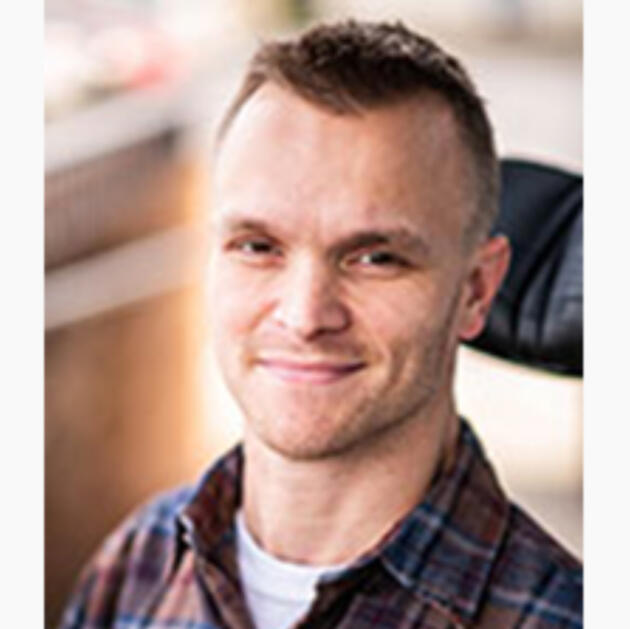
My name is Michael Sheffield, and I became interested in psychology, counseling, neuroscience, spirituality, philosophy, and world religions after struggling in my teen and young adult years to find my way. Learning and developing an understanding about The Human Condition became not only a passion project but also a lifesaving endeavor. I had to find a way out of addiction, depressiveness, anxiety, trauma, anger, procrastination, and insecurity before I destroyed my life. Among the many books I've studied and teachers I've learned from, the concept of The Middle Way has always been an apt metaphor for the transforming factor that united the different philosophies of life I wrestled with. It gave me structure with a method for analysis in life that would benefit me in every way possible.Near the height of my joyful exploration of life and building towards what it could be, I was running a food truck and teaching martial arts in a city I loved. 9 years ago that life disappeared when I had an accident that left me with a spinal cord injury and quadriplegic paralysis. The next two years of attempting physical rehab were challenging, but also some of the happiest of my life to that point. Having something taken from you can be an opportunity for growth in areas of your life that you never thought needed change. Still present with me was the perspective of The Middle Way. I attribute much of my joy at that time to all that which I learned before about living well.It was always readily apparent to me, once I accepted the disability I was living with, that I was going to take on professional counseling as the role I would play during the remainder of this life. No more cooking amazing fish tacos or teaching the proper form for a balanced front kick. I was going to teach people how to find balance so that they could create an amazing life. At 32 years old (in 2019), I had now decided to pour all of my energy into giving The Middle Way to others through a scientific evidence-based model within the field of professional counseling. I completed a master's degree, finished supervised residency, and obtained a professional license as a Counselor in the state of Virginia.I'm now 37, and I started Middle Way Counseling after having now worked with people for 5 years in my role as a Counselor. The creation of this business is the expected continuation of my desire to bring a scientific evidence-based form of The Middle Way to all who find themselves seeking the answers and motivation it provides. There are many more plans and goals along the path I'm walking, but the one that matters most is the individual person that reaches out to share their story and seek help with me. I enjoy having the important conversations that get to the heart of what matters in a person's life, and the core understandings of the pain and challenges that are holding them back.Through working with the people that are placed in front of me, I hope that the impact spreads to as much of our worldwide community as possible. It is not only individuals that need healing right now. Our human society at large is also suffering. We are facing acute challenges of separateness, loneliness, fractured community, meaninglessness, directionlessness, apathy, avoidance, misunderstanding, fear, anger, and confusion. While there is no one philosophy a person could claim would save us from these calamities, we each have our own wisdom and skills that could help to turn us towards freedom and truth as we try to save ourselves from ourselves. One by one I hope to help us reverse the tide of self-inflicted societal suffering.If you've read this far I ask that you scroll a little further and click the most appropriate button that will send a message from you to me directly. I ask you to do this because it's my calling, and I love what I do. I only wish to share that with you as we work through whatever challenge you're having. I want to help you find the will and skill to shape your life into the best version it can be.
Contact Us
Get in touch to learn more about how we can help to transform your life & mind.
How We Help
The Middle Way Explained
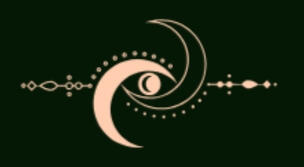
1/5 of “How We Help” Series
Est. Read: 4-6mThe Middle Way is a philosophy of life aimed at finding balance in a world with dichotomous extremes of perceptions, choices, and phenomena. The phrase “Not too tight, and Not too loose” describes this philosophy and its tools of examination well. The tension in the strings of an instrument must be in harmony with the sound the ear desires to hear for it to be experienced as beautiful. One makes minor tweaks while listening closely for the right mix of vibrations to create the sound it intends. The musician may use accurate tools to assist in tuning. Likewise, humans can use such methods to find the right “mix” as they attempt to tune into their best life.

The Yin-Yang symbol can also be seen as a visual metaphor of The Middle Way. It speaks to how one aims to walk the curved line between the yin and yang while respecting, observing, and utilizing aspects of any given dichotomy where appropriate. It portrays the wisdom of seeing that each side is inherently contained within the other, and that neither is superior to or ultimately even separate from the other. While the original concept of The Middle Way was created by the religious figure Buddha, its metaphor and lessons apply far beyond the scope of any potential dogmatic prescriptions of religion.

Looking through the lens of Middle Way perception gives us the ability to step back from the language of our mind and compassionately assess where we have been, where we stand, and where we're going. It gives us a method for properly evaluating the steps we are currently taking and deciding which steps to take next. With the advent of the scientific method and the proliferation of research aimed at the betterment of society, we have discovered, created, and improved our lives in so many ways. Middle Way strategies portrayed in today's scientifically validated language looks like evidence-based therapy and the skills, tools, and goals we use to make positive change in our own and others' lives.The therapeutic modality that perfectly fits The Middle Way is Acceptance and Commitment Therapy. The shorthand for this modality is ACT. It is pronounced just like the word act, because this therapy is all about creating new and effective action in a person's life. An ACT therapist's goal will always be to help you figure out where you are “out of tune” or “off the path”, and to get you back in tune and moving towards the north star of your ideal life. We call this your most Full and Meaningful Life. ACT is covered more comprehensively in subsequent articles that explores what ground level presumptions, predictions, and prescriptions this therapy espouses to help people find balance and function better in their lives.For now, I will simply describe the three aspects of the treatment pyramid of ACT. ACT is all about Opening Up, Being Present, and Doing What Matters. Opening Up is about acknowledging, analyzing, making space, and effectively responding to thoughts, beliefs, and feelings that we often struggle with. Being Present is all about getting out of your head and into your life. Learning the skills of Being Present also has much to do with reforming your perception of your “Self”. Doing what Matters is all about getting in contact with where you want to go in life and using science-based strategies to get there. Through experiencing this counseling modality with us, The Middle Way becomes a living practice of habits, skills, and intentions that can help you to get unstuck and in tune with your best life.
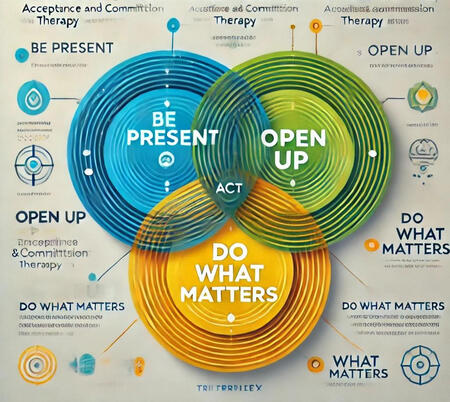
This wraps up our discussion on The Middle Way and what it means in relationship to your potential counseling opportunity. Check out our other articles if you want to learn more or contact us with the appropriate link for a discussion about getting started.
The Problem Solving Mind & Our 21st Century Challenge
2/5 of “How We Help” Series
Est. Read: 7-9mAs you start this journey of learning what ACT is all about, it's important to know some of the underpinnings of why this treatment/coaching strategy is important and helpful. This article is one of the first steps towards that knowledge. We posit that humans have run into an evolutionary mismatch between the challenges of day-to-day living, created by our underlying desires, and our minds' ability to present solutions that sustainably work. At this point is very important to understand how we ACT counselors define the word “Mind” with two main points. 1) The Mind is most simply an “ordered collection of words” (thoughts, beliefs, perceptions) inextricably linked to the sensations of your body (emotions/feelings, senses, urges). And 2) the Mind utilizes these words and sensations to attempt to solve the problems and challenges of our life.You are not your Mind. Your Mind is a part of who you are, but only a part. This statement is a belief or what you might call a theory. I am not trying to convince you that this is the true definition of Mind, but rather asking you to explore whether utilizing this framework of “Mind” can help to get your life moving in the right direction. For that purpose, we ask you to remember this definition of Mind as you read.We live in a period of astonishing comfort, opportunity, and safety in the 21st Century when compared to our past. That point is undebatable. Surely I acknowledge that there are significant current threats and societal challenges (fractured communities, increasing global and domestic conflict, technological addiction, cybersecurity threats, economic uncertainty etc) to a secure future in the here and now. But what our past 100 plus years have provided through engineering, manufacturing, telecommunications, technology, and healthcare is nothing short of an Earth rattling evolutionary shake-up.No longer do we need to forage or hunt for food. No longer is being ousted from the group an existential threat to our life. No longer must our lives remain small to remain safe. But we are still stuck in many of the instinctual responses of a time where those and other hardships were true, and it's leading to behavioral and emotional dysfunction in a large percentage of our populace. I suggest here that our automated mental strategies are not keeping pace with the speed at which our world is evolving around us. The mental strategies we needed in our less stable past required urges to focus solutions on short-term needs and results as opposed to long-term outcomes. Seeking shelter, comfort, gratification, and safety as priorities were adaptive in the past, but can lead to emotional and behavioral problems in our safer present moment environment. Oftentimes it is these short-term strategies that we need to let go of in order to succeed at living well.Human beings are inherently motivated towards certain things related to their survival and ability to thrive as a matter of instinct and evolution. While there has been plenty of debate and research on the topic, many ACT therapists conceptualize their client's challenges utilizing six internally motivated energies that we agree are fundamental to an individual functioning well. The six categories are Belonging, Coherence (sensemaking), Feeling, Orientation (to time, place, and person), Self-Directed Meaning (autonomy), and Competence. Many ACT therapists would call these categories the basic human Yearnings. One look at the list and it's not hard to agree, or at least make an argument, that all six are crucial to a person's well-being.Having motivation towards these yearnings is one thing, but actually succeeding at them is another. In this 21st century there are many of us struggling in one or more of these six areas. Having deeply connected relationships, making sense of the world in a way that we feel free to act in it, having a full and varied experience of the world, being fully present for the most important moments, finding enjoyment in the mundane, knowing what's important to us, and successfully acting on and achieving our goals sounds like a great life if you're succeeding at these. I would wager that there are probably a few of these statements that every person either previously or currently struggles with. Feeling alone, confused, shut down, lost, unmotivated, rigid, avoidant, bored, incompetent, overwhelmed, afraid, guilty, ashamed, and sad are often the effects of struggling to meet one or more of these drives or yearnings we listed before. Nearly everyone has experienced these struggles, because many of us have been relying on the same outdated functions of Mind to solve problems. This default mode alone cannot consistently solve life challenges in a meaningful and long-term way.
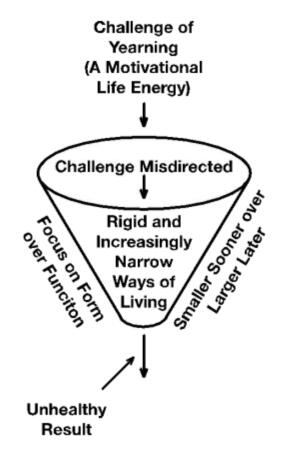
So what do we do about all of this? The good news is that the Behavioral Sciences have come a long way in creating new methods to portray the crucial information and build the internal wiring required for a person to succeed at achieving their yearnings where they had previously failed. The set of skills that we intend to teach you are aimed specifically at helping you to sustainably achieve your heart's desires. The evidence found in the ACT research shows that the people who develop these skills are more effective in their work/hobbies, stick to the diet or exercise goals, have healthy relationships, boldly face disease and disability, succeed in athletic competition, and progress more effectively in a vast number of other human endeavors we pursue. This is to say that ACT helps us to live our best life.So that is what we aim to do: Teach you the skills to think and feel more openly, have more voluntary ability to be present with what shows up in your experience, connect with others more authentically, move your life towards your ideal, build habits that work, and learn from the pain you've experienced in a way that teaches you what your life is going to be all about. Once we've helped you to effectively adopt these skills you will have become what we call Psychologically Flexible. It's time to take the steering wheel of your life back from a Mind that has been trying to solve these problems for you in an outdated and inflexible way. Psychological Flexibility is the method with which we help you drive towards the life you want, because enough is enough.
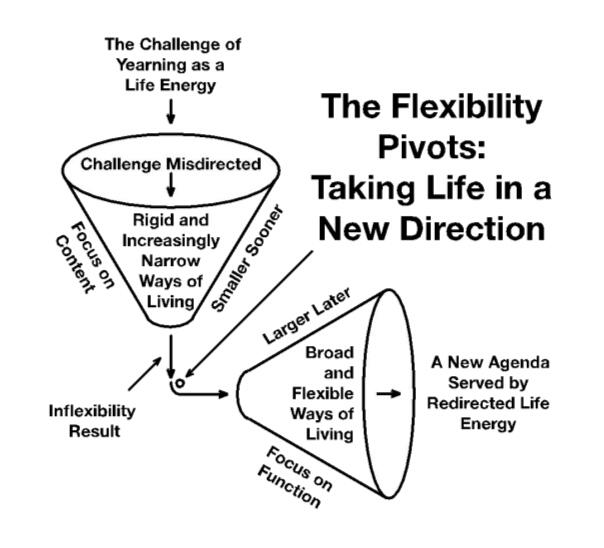
This wraps up our discussion on The Problem Solving Mind & Our Challenge in the 21st Century, and what that means in relationship to your potential counseling opportunity. However, there is so much more to understand about the process and that's where the subsequent articles found here will come into play. Check out our other articles in this series (preferably in order) if you want to learn more, or contact us with the appropriate link for a discussion about getting started.
Acceptance & Commitment Therapy (ACT for Short)
3/5 of “How We Help” Series
Est. Read: 3-5mAcceptance and Commitment Therapy is a form of therapy that started in the 1980s and has continually developed through an enormous and driven community of behavioral scientists. This counseling community is aiming their committed energy at building a better world by working to improve our societal institutions at large as well as one by one with the individual people we counsel. ACT, pronounced just like the word act, is a therapy focused on our actions and positively affecting the choices we make in the many pivotal moments found in everyday life. ACT therapists aim themselves at helping you to build your best life and become your best self. We posit that most people seek therapy because their life is currently stuck. If you continue to read the articles of this website you will see the many different conceptualizations of how different “diagnoses” or unique life challenges can become stuck (see Who We Help). We seek to understand the ways in which your life is currently stuck, and to uncover the things you would like to see happening in your journey. Once we are clear about these two things we can go to work at getting you unstuck.As covered in “The Problem Solving Mind & Our Challenge in the 21st Century”, ACT therapists presume that human beings have a collection of six Yearnings that motivate their life in functionally important directions. The six Yearnings are Belonging, Coherence (sensemaking), Feeling, Orientation (to time, place, and person), Self-Directed Meaning (autonomy), and Competence. Efforts to succeed in each of these six Yearnings brings about specific but individually unique challenges in a typical human life. The difficulty we face in solving our Yearning challenges come about due to what we call our human species’ problem solving mind. The simplest explanation is to say that our problem solving minds offer up life solutions (in the form of urges, thoughts, beliefs, rules, logic, feelings etc) that inflexibly focus on short-term results in a way that leads to long-term dysfunction.For long-term functioning we need long-term strategies. This is where Acceptance and Commitment Therapy hangs its hat. Our home is teaching and helping you to implement new attentional and committed behaviors that get you moving in the right direction and staying consistent on that path. A brief overview of a few specific strategies for getting unstuck will be covered in a subsequent article called “Psychological Flexibility & Skills”. Before learning about strategies of change, it is exceedingly important to confront the agenda that we each are consciously or unconsciously engaging in with our current life strategies.Just because a person is stuck does not mean that they were making illogical decisions. They may even identify many of their previous chosen behaviors as consistent with their personal beliefs. But if a person is making logical decisions consistent with their personal beliefs why are they stuck? Again, this comes down to a problem solving mind presenting us thoughts, beliefs, feelings, urges etc that are often aimed at fulfilling short-term desires in ways that can be very hard to see and with devastating costs to long term functioning. We conceptualize that human minds are both our best friend and our worst enemy at times. When your only perspective comes from within the very mind that can unknowingly be working against your long term interests, it's easy to see why we get stuck.Once we know the direction you want your life to go, an ACT counselor's most important job is to help you confront the old “agenda” of serving short-term interests in favor of a new “workable” agenda. In order to better understand confronting the agenda and workability, jump to our next article by clicking below. If you have read enough and would like to grow through counseling, then contact us with the appropriate link for a discussion about getting started.
Workable Strategies for Building a Full & Meaningful Life
4/5 of “How We Help” Series
Est. Read: 4-5mACT operates as a set of strategies for evaluating the most important domains of a person's life, creating relevant therapeutic experiments, and then utilizing language or attentional tools to affect the outcome of the experiments. These experiments are aimed at evolving a person's system of behavioral choices such that those choices lead to more success in life. One important form of language is belief. A belief about life is an ideological agenda that structures how we behave for an underlying purpose. ACT therapists make no assumptions about whether a person's given belief about life, the world, or themselves is true or false. Instead we ask the question of whether the response you have to a belief is useful and helpful to achieving your goals that matter most. So in short: We evaluate.Sometimes we then work on creating experiments for a person to respond to their beliefs in new and different ways. What happens when you do so? What do we learn when we respond behaviorally different to a belief or rule about life? Did we find some success or new experience that previously alluded us when we respond differently? We do this not to try to change what you believe, but rather to change the function of that belief's effect on your choices. Why? Because our goal for you is to live your most full and meaningful life. Our tool to evaluate whether the experiment succeeded is called workability.Workability is a life question only you can you answer about whether the pattern of behaviors you are engaging in work for you. If you were to continue to behave the same way, in the same context, over an extended period of time; would that still work for you? For instance, if you are avoiding relationships because “I might get hurt” or “People can't be trusted”, then one question we might ask: Is the loneliness and self-doubt that results from this avoidance workable in a way that you would prefer to continue avoiding relationships? If not, then what are some potentially workable patterns of behavior you would like to try (that are different from your previous choices) even if you might get hurt? When you try these new behaviors, aimed at moving closer to relating with others, does your life have more fullness, meaning, or connection? Did your prediction of harm come true? What else showed up when you tried to connect with others? Evaluating life through the lens of workability allows us to help you find YOUR most ideal balance between what you've been doing and what you could start doing now that works better.As previously mentioned, an ACT therapist is constantly working to help you confront an old agenda (i.e. a belief and its rules), as provided by your own problem solving mind, by asking the many questions of workability. Based on which Yearning (Belonging, Coherence, Feeling, Orientation, Autonomy, Competence) a person is pursuing at any given time, we help you to see and evaluate how workable your pattern of choices have been in that pursuit. Workability itself is a complex skill that we help you to learn as you gain experience with shifting chosen behaviors and utilizing the skills of Psychological Flexibility. The takeaway here is we are going through the process of evaluating, experimenting, changing, and evaluating again when we utilize the concepts of ACT and workability. It's a process that continues on and on.Psychological Flexibility has 6 sets of experiments or skills that each correlate to the 6 unique Yearnings of life. They are all about learning how to go from inflexible behavior, that leads to stuckness, towards new flexible and workable strategies that build up our selves and our lives. Check out our last article in the “How We Help” series to learn about these skills, or contact us with the appropriate link for a discussion about getting started.
Psychological Flexibility & Skills
5/5 of “How We Help” Series
Est. Read: 10-15mIn the final article of our “How We Help” series we will cover in significant but relevant depth the concept of psychological flexibility. We will approach some of the skills one learns along this path of development. Make no mistake: This is still an abbreviated summary of the topic and relevant skills. Covering this material entirely is impossible in an article format. The vast array of experiments and skills that have come from the ACT community's exploration of “living well” has grown beyond something you can even list alphabetically without a full length book.Below is a simple list of the six domains of the psychological flexibility and inflexibility model and an accompanying visual representation. For every inflexible process there is an equal and opposite flexible process. A process, as defined here, is any successful or unsuccessful pattern of human behavior aimed at fulfilling a Human Yearning (whether successful or not). The first process of each bullet point is a potentially inflexible pattern of behavior, while the second process of each bullet point is a flexible pattern of behavior. You may not be familiar with any of these words at the moment, but by the end of this article you should understand them to the degree needed at this time.
A process is any successful or unsuccessful pattern of human behavior aimed at fulfilling a Human Yearning
● 6 Core Processes of Inlexibility vs Flexibility
● Fusion with Thought -vs- Cognitive Defusion
● Experiential Avoidance -vs- Acceptance
● Past and Future Focus -vs-
Flexible Contact with the Present Moment
● Conceptualized Self (Ego)
-vs- Self-as-Awareness
● Loss of Life Direction -vs- Chosen Values
● Inaction and/or Perfectionism
-vs- Committed Action
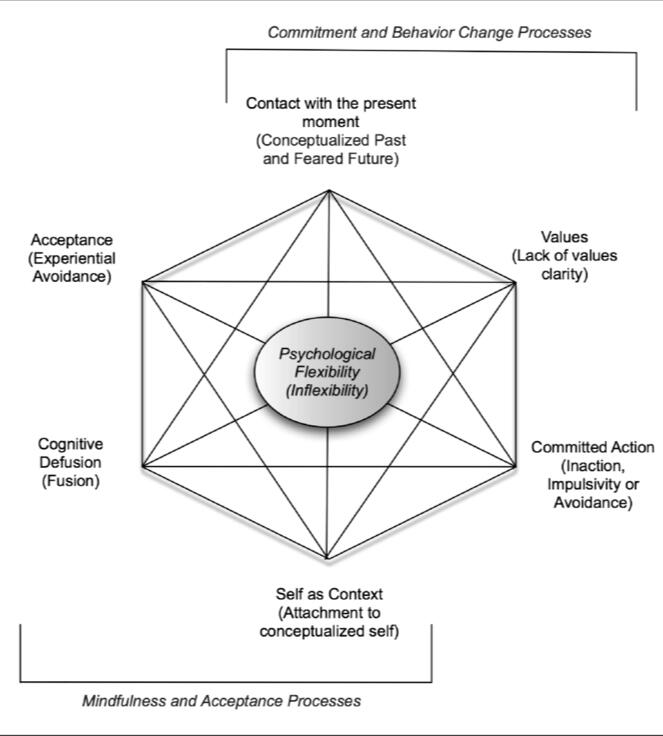
If our goal is for you to live your best life then what we need to do is get you moving your life in the direction you would like it to go. Inflexible processes tend to keep us stuck, while flexible processes tend to get us unstuck and moving. As previously mentioned in article 4, whenever a person is stuck it's important for us to confront the agenda that your problem solving mind is giving you in its attempt to solve the challenges of life. The potentially inflexible processes listed above are tantamount to all of the short-term solutions our mind tends to offer us. These inflexible processes are the parts of your life that we are trying to confront as unworkable.
Inflexibility is the treatment target of all ACT work.
Let's go down each one of these to understand what our mind is trying to do to help us, and then see how it can go wrong. As we confront the inflexibility in our reading of each category, let's look together at a different life direction we could take that is more flexible and potentially more workable.
● Fusion with Thought -vs- Cognitive Defusion
Cognitive Fusion (Fusion with Thought) is a process (aka agenda) of the problem solving mind that implies a person has let their thoughts, perceptions, memories, urges, or beliefs grab their awareness/attention and direct their behavior. The action is often NOT chosen from among alternatives or with an open perspective. Rather, these actions are often chosen automatically based on our Mind's “definition” of what is “Right”. Automaticity is not inherently a bad thing. This is just our Mind trying fulfill the normal internal drive towards Coherence (For things to make sense). This natural healthy drive can lead to the Mind wanting you to: “agree with the thought in my head, because it seems to be true and needs to be right for the sake of a Coherent world”. When a person is automatically doing whatever their mind says or urges, we could consider that being Fused with their thoughts. Some ACT counselors would use the term “automatic mode” to quickly characterize this behavior.When fused with a cognition, it can seem like:
● something we must obey, give in to, act on
● a threat we need to avoid or get rid of
● something very important that requires all our attention.A person is only fused with their thoughts INFLEXIBLY if the action that proceeds from it is an action they decide is not working for them in the long run. It's not workable. Inflexible Fusion that dominates us into unworkable behaviors or attentional processes is what we would call getting “hooked in” to a Fused thought. Fusion is not always a “bad thing” that you get “hooked in” to. Sometimes you need to Fuse flexibly with the logical set of thoughts you have in your mind about how the world works and the “right” thing to do. In fact, a lot of times that's true and we humans almost constantly fuse with thoughts in a flexible and workable way.For example, getting out of bed in the morning we automatically and unconsciously fuse with many beliefs we have about “how gravity works” and/or “what would happen if we stayed in bed all day”. After waking up, we eventually get out of bed to do something with the day because of these and other useful “Fused” beliefs. When doing our taxes we Fuse with the beliefs about “how computers work”, and that “the IRS will come after us if we don't pay our taxes”. Eventually, when Fused with the many thoughts about taxes, we just do our taxes as a functional & automatic reflex. “Do your taxes” is probably a good thought to get fused to once a year. “Don't go down dark alleys” is an easy rule to get flexibly fused with in order to protect ourselves. There is a healthy level of Fusion that shows up as human beings simply following logical beliefs about the way the world works in a way that helps them to predict outcomes and engage in life more effectively.When we have significant patterns of Fusing inflexibly with our cognitions, it is often done in the name of “being right”, even if what we’re doing is negatively consequential). We turn our life into a problem that we are trying to solve by forcefully trying to make everything sensible, logical, predictable, provable (by the evidence of our past), and/or orderly. We often can get fused with thoughts of the past, the future, our self-concept, our reasons, our rules, or our judgments. Let's look at “rules”, which is a common fusion, and imagine how it can lead to some of the others.For example, “I should” or “people should” rules can become a significant pattern of inflexibility when it leads to behavioral or emotional dysfunction as a result (excessive criticism, guilt tripping, shame spirals, being stuck in our head, etc.). Intense urges to do something we “should” in the future (that we've struggled with in the past), might lead to fear of failure. This fear may lead to unhealthy coping mechanisms such as comfort eating or doom scrolling in order to avoid or minimize the fear, guilt, and/or shame of failure. We might ruminate (overly focus) on our success or failure at following the should thoughts in our past. If you tend to fail at following your “should” thoughts with the expected behavior, your mind may judge you as inherently “bad” at the core. The mind says: If you don't do what you “should” because of “x” reasons, then you must be “bad/broken”. If you let these thoughts inflexibly affect your behaviors or attentional processes in an unworkable way, you may now have a fused pattern of beating yourself up through a negative self-concept or of avoiding others in order to avoid the negative internal judgments that may show up. The pattern becomes stuck and it all started with letting a should thought dominate your behavior and/or awareness.Succeeding at behaving according to Fused “should” rules might lead us to Fusion with judging others who don't do the same. If “they should too” (but don't), then you may spend a lot of time and energy thinking about their past mistakes, being passive aggressive because “x should have”, or criticizing others for their choices that don't align with your expectations. This is your Mind getting you fused to the “should” thought, all because you leaned a little “too far in” to needing the world to “make sense” and for things to be “done right”. Unfortunately, even though Coherence is a useful drive, humans often try to bend the world to our will through the behaviors of ruminating, judging, punishing (self and/or others), and avoiding in an attempt to keep our inner world “logically sensible” and “right”.Either way, a common outcome of inflexible Cognitive Fusion is that we tend to spend more and more time in our head sorting out what is right and what is wrong for the sake of a “literal” coherence. Literal Coherence simply means that the way we end up trying to make sense of life is to try to make the words in our head match the reality we are presented with. Literal coherence is trying to make us be “right about things”. This is the problem solving mind at work giving us the short-term solution of “rightness” through the urges to impose order in our mind and life. What we may need instead is a long-term solution for Coherence. One that helps us to make sense of the world in a way that we function in it best. What we may need is a more Functional Coherence.Focusing our motivated energy for coherence on learning what works in life allows us to take this normal healthy drive and turn it towards a more useful and workable direction than an overly simplified literal coherence. When our desire to “get it right” is put to the new task of making sense of a successful working life, we often end up with a wonderful peace of mind and a real living wisdom about our ongoing choices in life. To get to this place we need to learn the skills of Defusion.
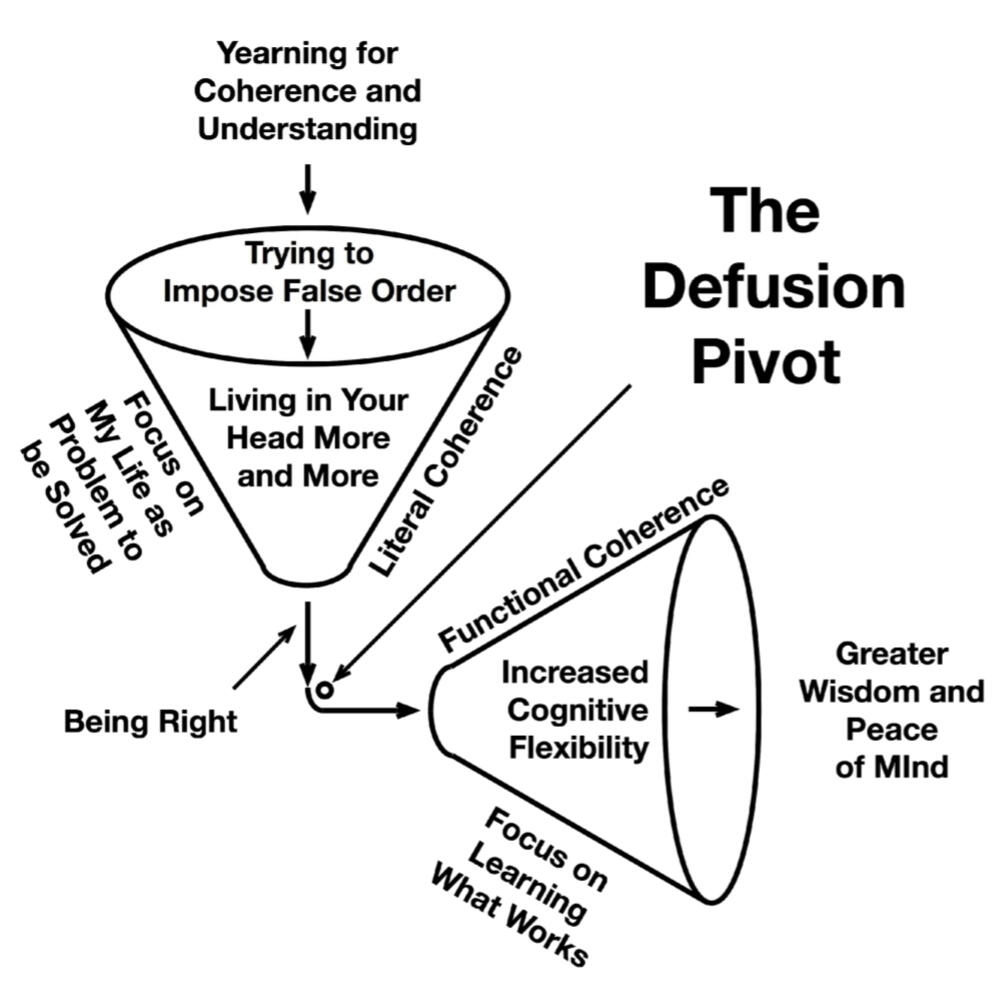
When we Defuse from a cognition for this new “functional” agenda, we can see the cognition for what it is: a group of words or pictures “inside our head.” We can recognize that it:
● is not something we have to obey, give in to, or act upon;
● is definitely not a threat to us; and
● may or may not be important—we have a choice as to how much attention we pay it.Defusion means learning to “step back” and separate or detach from our thoughts, images, and memories. It means to “watch your thinking.” The full technical term is Cognitive Defusion, but usually we just call it Defusion. We step back and watch our thinking instead of getting tangled up in it. We see our thoughts for what they are—nothing more or less than words or pictures. We hold them lightly instead of clutching them tightly. We allow them to guide us, but not to dominate us. Sometimes Defusion is as simple as setting the intention and following through on the plan to say “I'm Fused right now” or “I'm getting hooked into this” when the Mind dominates us verbally into ineffective behavior. Other Defusion skills might look like repeating judgmental phrases for 30 seconds, grounding (taking deep breaths, scanning the room, etc.) to bring us more into the present moment, naming the thought as a “thought”, or saying the thought in a silly voice. There are many other skills beyond these but depend on the individual person's context (far too many to list here).These are some of the skills you would learn by first being introduced to them, and then by practicing them much like you would the guitar. The more you practice, the better you get. The better you get, the better your life gets. This happens when we make a commitment to shift our focus towards growth and discovering what works as opposed to what seems to be “literally” correct in that moment. We've seen how Fusion and the drive for Coherence can often lead to focusing on our life as a literal problem in ways that create rigid living. Fusion often leads to another inflexible agenda called Experiential Avoidance. Next we'll learn more about how and why this Avoidance agenda often dominates our lives.
● Experiential Avoidance -vs- Acceptance
Experiential Avoidance is another agenda of the Problem Solving Mind that can be simply described as the Mind urging us away from activities that could potentially be fulfilling, healthy, or otherwise important for us. Understanding humans' reasons for avoidance is not overly complicated. We all have an inborn Yearning to Feel and that nearly always will eventually turn into a desire to feel good. There's not inherently a problem with wanting to feel good. The problem arises when the Problem Solving Mind pushes the agenda that we must get rid of the “bad” feelings that may occur in our lives.As a short-term solution, avoiding “bad” feelings/experiences is not always unworkable. Don't touch a hot stove. Don't dive into a shallow pool. Don't approach a person that looks dangerous or angry. These are all intelligent strategies of the Problem Solving Mind aimed at protecting us from bad experiences and bad feelings. Unfortunately, over time the Problem Solving Mind begins to become overly confident in the usefulness of it’s strategy to avoid negative experiences. In the long run the Mind starts to invite us to avoid even the potentially positive experiences that could lead to lasting fulfillment and happiness. It uses logical arguments and avoidance urges keep us away from pursuing goals because it could lead to discomfort or emotional pain of some other form.Relationships offer an enormous amount of potential for happiness and connection in our lives, but many of us have become chronically avoidant of pursuing friendships, family, or intimacy. Sometimes it only takes being hurt once for the Problem Solving Mind to suggest “never being close to anyone again” or “I'll be hurt if I express myself authentically”. Avoidance of hopes, dreams, or passion projects is a common experience as well. Sometimes this happens in a person's life because their Mind has associated pursuing these goals with the pain of fear, shame, failure, or discomfort of many other kinds. Assumptions like “I don't have the resources/skills I need” or “I'm too far behind” are arguments the mind subtly uses to convince us back to the comfort of avoiding our dreams. Our Problem Solving Mind can easily give us any number of rigid verbal rules or assumptions to “Fuse” to for the agenda of Avoidance.The longer we allow our Mind to bully us into Avoidance, the more emotionally dysfunctional we become. The chronic nature of shutting down our natural and healthy emotional messengers, that come from having a varied life experience, leads to a host of long term problems with our functioning including apathy (lack of motivation), dissociation (numbness), loneliness, overwhelm, anhedonia (lack of enjoyment), repeating the mistakes of our past, and so much more. Once we can deal with our Mind’s unhelpful logical arguments using Defusion, we can begin utilizing the workable process of flexible Acceptance to open ourselves up to the world of Feeling and Experiencing we so Yearn for.Acceptance does not mean to tolerate or resign ourselves to challenging thoughts or emotions while forcefully pushing through the experiences that bring them up. We are more than happy to utilize Avoidance as a strategy when it is done with balance and choice. Acceptance is a skill to be used when we can see that the difficult experiences cannot be avoided successfully in a long-term effective way. The flexible version of Acceptance then arises as an opportunity when we can point ourselves in the direction of life choices we know we want to make, predict the challenges we will face, and make space for them to arise without struggling against them.The skills of Acceptance include allowing, participating (exposure), self-compassion, validation, acknowledging, exploring, scanning, moving, welcoming, expanding, soothing, grieving, forgiving, and/or savoring among others. Each of these words has a process and a purpose aimed at helping us to go from wanting to Feel “BETTER”, on to the practice and skill of flexibly FEELING our feelings “Better” (i.e. more effectively). The benefits of making this pivot are extensive and absolutely crucial to living a full and meaningful life.
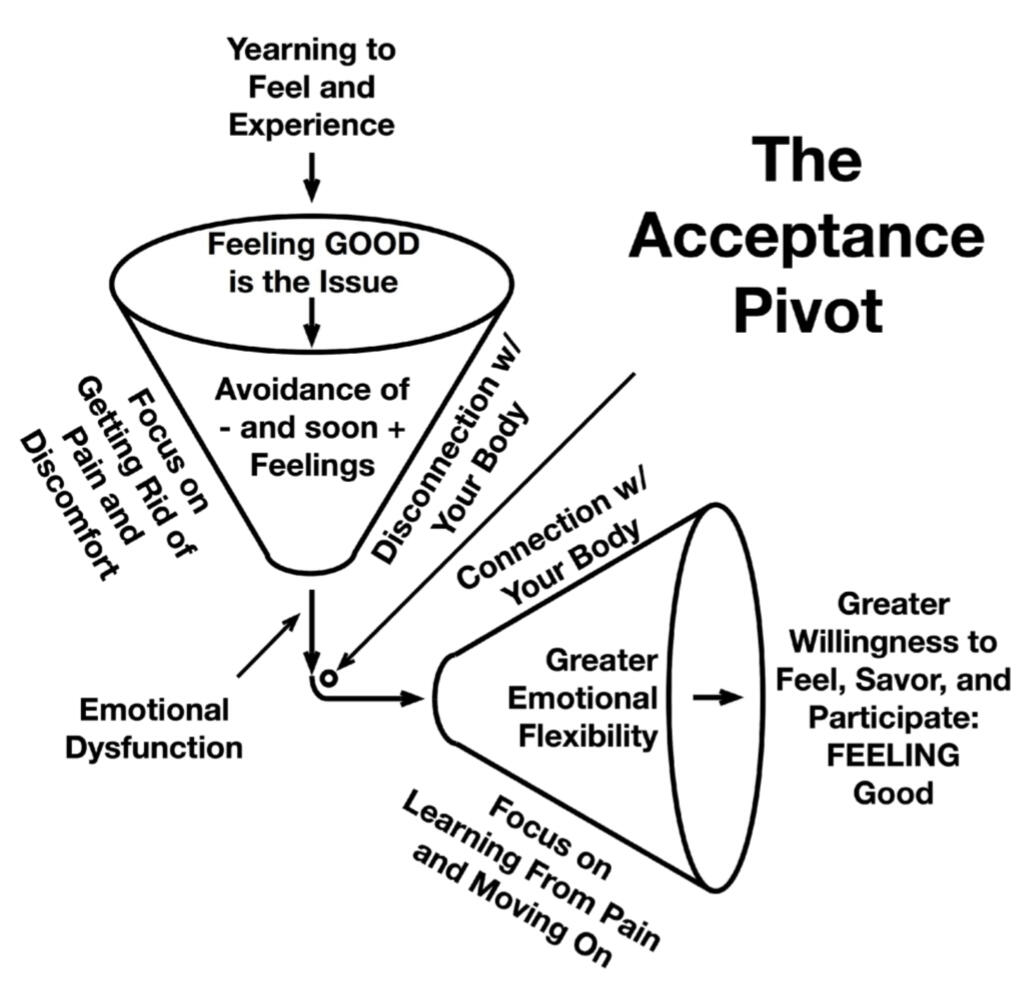
When we turn towards our experience and feelings with Acceptance skills, we can start learning from our pain. When we can successfully move through pain onwards and into new life challenges, we become more emotionally intelligent, prepared, in touch with ourselves, and aware of our needs. We treat ourselves more compassionately which leads to treating others the same. Connection with our body leads to opportunities to experience life on a deeper level than we were previously capable. We begin to be able to trust emotional signals and find safety in our body. Our relationships become more fulfilling and a new vitality in our body leads to more opportunities for joy, pleasure, and success. This is the rich and enjoyable lived experience that everybody can have.Avoidance is not the last of the strategies of a Problem Solving Mind that humans struggle with. Sometimes Avoidance is connected to another strategy of the Problem Solving Mind called Conceptualizing. This is a pattern of focusing our attention on the “stories” of our past and future. Sometimes we fall into Conceptualizing simply for the purpose of escaping the present, but other times it is Conceptualizing for the sake of Orientation. Let's look at this Yearning and how Conceptualizing can sometimes trap us.
● Past and Future Focus -vs-
Flexible Contact with the Present Moment
Conceptualizing is placing our focus on the stories and problems the Problem Solving Mind portrays to us about our life. This behavior is the Mind's strategy for helping humans to figure out or understand their “place” in life, predict dangers, or to simply solve the problems in their life. The Mind will urge us to place our attention on the content and definitions of the problematic details. Again, such an intention and strategy as stated above is not inherently a bad thing. The Yearning that applies here is called Orientation. Orienting is defined as: “to determine the relative physical or intellectual position or direction of something”. We humans Yearn to Orient for innumerable and important physical, emotional, and cognitive reasons.Without a strong drive towards Orientation, we would not be able to effectively pursue the opportunities to crawl, stand, walk, jump, run, grab, throw, hug, or kiss. Each of these physical activities requires a brain and Mind that can efficiently and effectively judge the relative distance and path between two or more physical objects. We learn the ability to Orient rapidly from the moment we come out of the womb and into the world. We pursue the above activities throughout life with a continuous and similar tenacity to that of the hungry infant yearning to fill itself with its mother's milk, but without the drive to Orient we would inevitably fail. Throughout our maturation, we begin to apply the ability to physically Orient towards our emotions and cognitions as a new strategy to intellectually predict, prepare, and problem solve life's challenges. Problem solving is essentially an ability of mentally “Orienting” concepts. Concepts are made through our ability to relate and use language to define “things” such as we saw with the Yearning for Coherence. It is one of the greatest assets the human Mind has, and it is one of trait that sets us apart from every other creature by the tremendous extent to which we can do so.Conceptualizing, just like Fusion and Avoidance, clearly has value in that it attempts to help us Orient ourselves with a calculated distance between us (the person) and a potential problem, belief, judgment, prediction, story, reason, rule, or self-concept. The degree to which each individual human needs to effectively conceptualize to meet their life needs or work requirements varies tremendously. In no way should one read this section and presume that conceptualizing is a bad thing. The problem occurs when the individual is continually dominated by the urge to attend to the past and future rigidly.If one's attention is constantly outside of the present moment it is likely they are missing important information, events, and opportunities occurring in the now. In this case, it may be important for the individual to take a measure of the “Workability” in the choice to attend to the Mind’s mental musings. There is a degree to which I think most would agree that life happens in the now, not in the imagined future or the storied past. It is in the present moment that we can find the most useful information to our lives and the direction we want to go. If our life is yearning for Orientation, maybe a better solution is to practice Orienting ourselves to the information that most usefully points us towards our ideal self and ideal life. The information that actually lets us learn about the direction and requirements of living our life successfully.
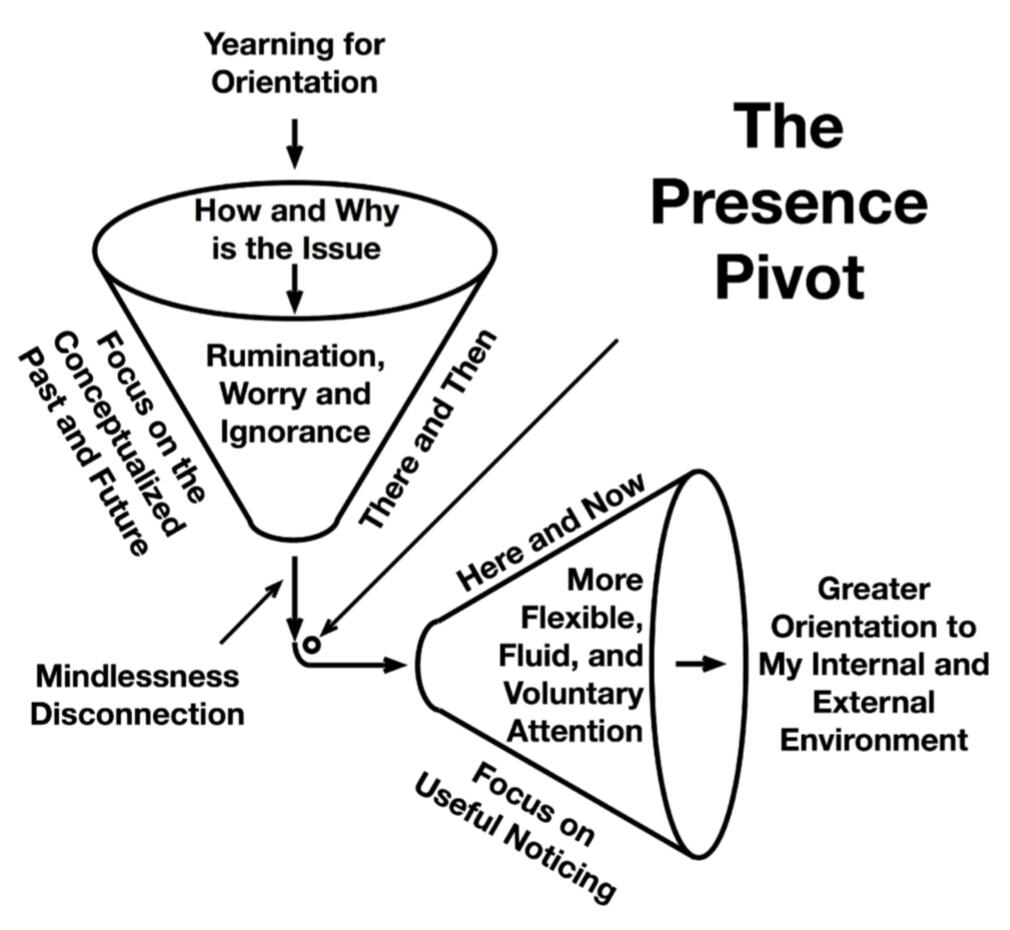
Sometimes the most important information will be in the imagined future or storied past no doubt. The important thing here is to aim for a flexible attending to the past and future and only when it is useful. If we notice that our attention is dominated by the past and future with no answers coming from that domination, we can somewhat easily find that the information is not as useful as our Mind may think it is. A good metaphor for flexible attention is the flashlight. We can expand and focus our attention just like a modern flashlight. There are times when a broad awareness is more useful, and times when a focused beam of attention is what's needed. Practices for flexible attention to the now include simple meditations, expanding and narrowing, looking inward and outwards, and shifting between single and multiple targets of attention. These exercises train our attention to come more under our control for the purpose of flexibility and the living life we intend.It is important to note that there is a vast array of attentional practices in the contemplative and meditative traditions. One of the pitfalls of the meditative spiritual traditions is the all too common search for the red pill or Magic Bullet that will “save us” from all of our problems. This common mental strategy has at times been nothing but another presentation of the Mind’s Yearning for Coherence and Experience getting stuck in Fusion and Avoidance. When one perceives there to be a “right way” to meditate to become “unburdened”, the outcome is often the extreme burden of rigidly approaching attentional practices in an Avoidant way. Their life becomes a problem of fixing their problematic life with the “right” meditation practice (Fusion with thoughts/beliefs!!). This outcome is nearly the exact opposite of the most effective aims of meditation and attentional practices.Research shows that meditation is most fruitful when practiced with the aim of building flexibility skills, not as an escape from the pressures of life or a way to try to suppress feelings. Meditation’s benefits come specifically from using the practice to build attentional flexibility on purpose: to become more fully engaged in life, not to “get away from it all”. We ACT counselors aim to help you fulfill your desired Orientation to life. Together we confront the agenda to Orient in “time”, and then we pivot towards Orienting to your internal and external environment in the most useful way you can. Instead of making your life a problem to solve and ending up lost in “time”, we become present with the information we can actually use in the “Now”. Next let's look at what the Now might be all about in successful, full, and meaningful human lives.
● Loss of Life Direction -vs- Chosen Values
Come back soon for the conclusion of this article.
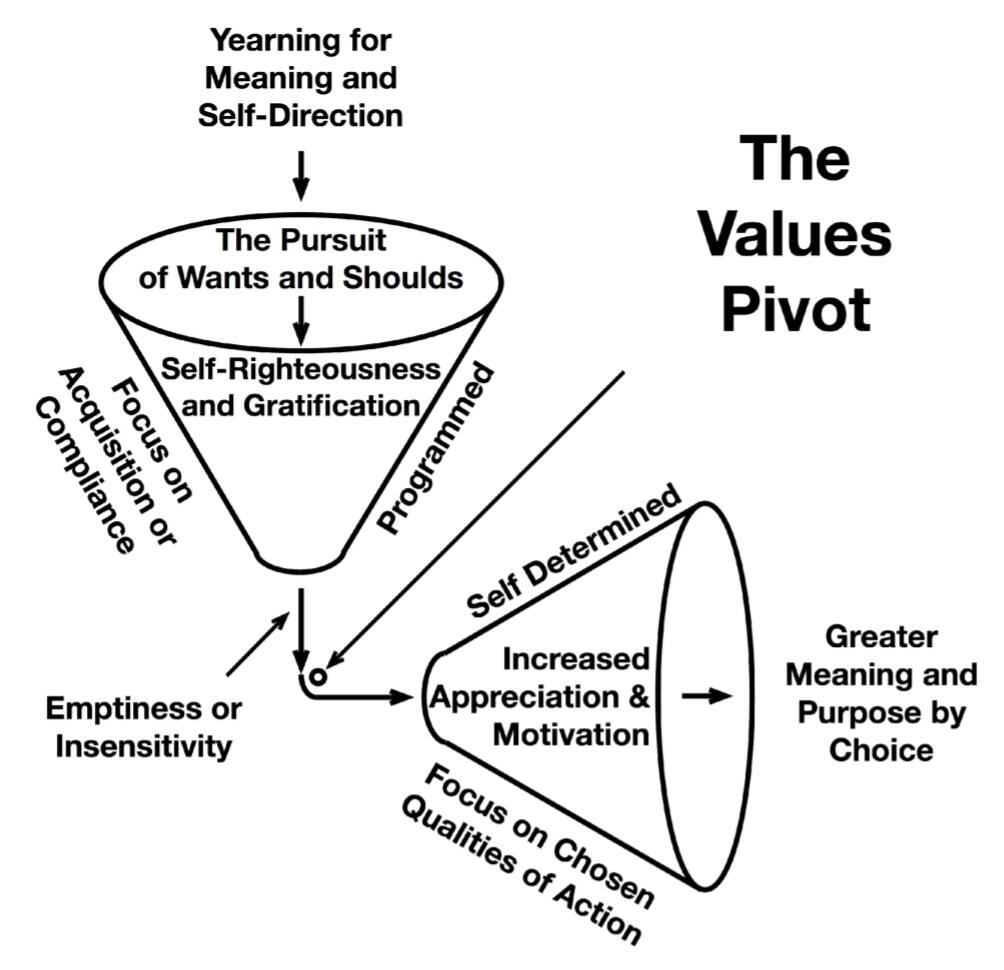
● Inaction and/or Perfectionism
-vs- Committed Action
Come back soon for the conclusion of this article.
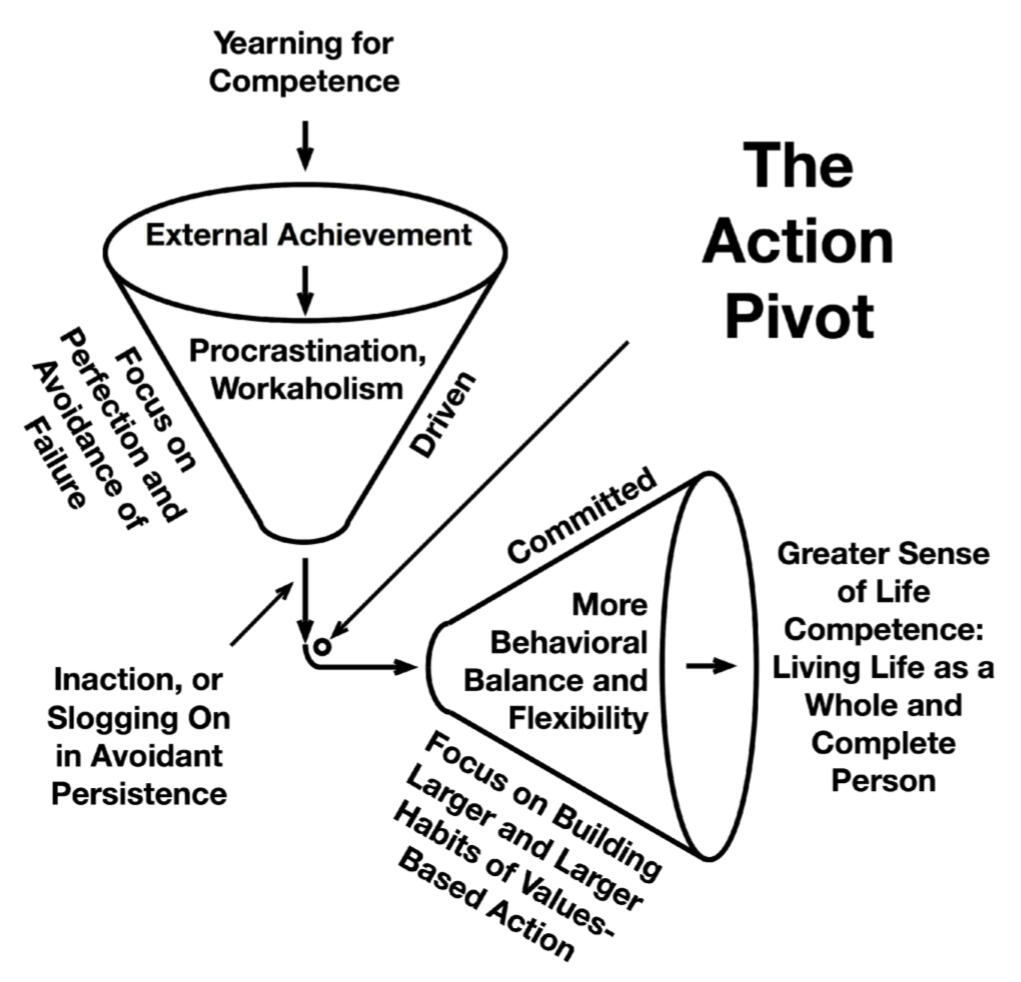
● Conceptualized Self (Ego)
-vs- Self-as-Awareness
Come back soon for the conclusion of this article.
